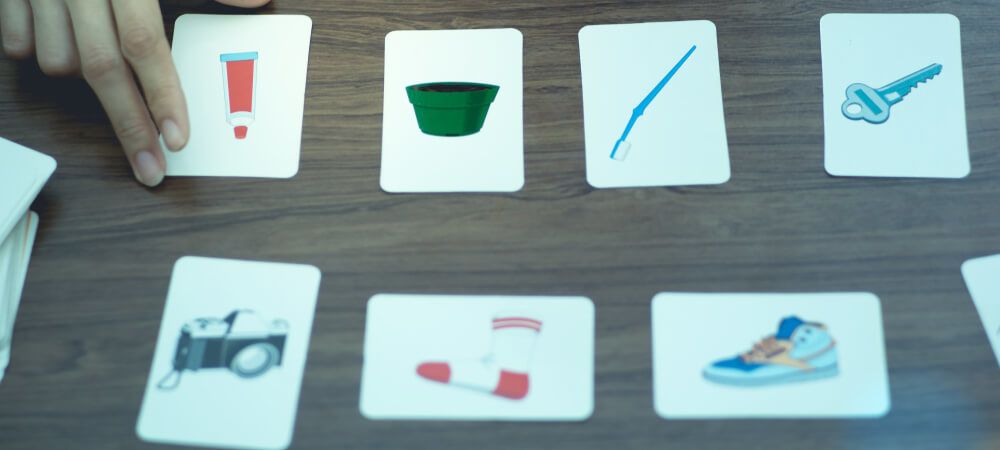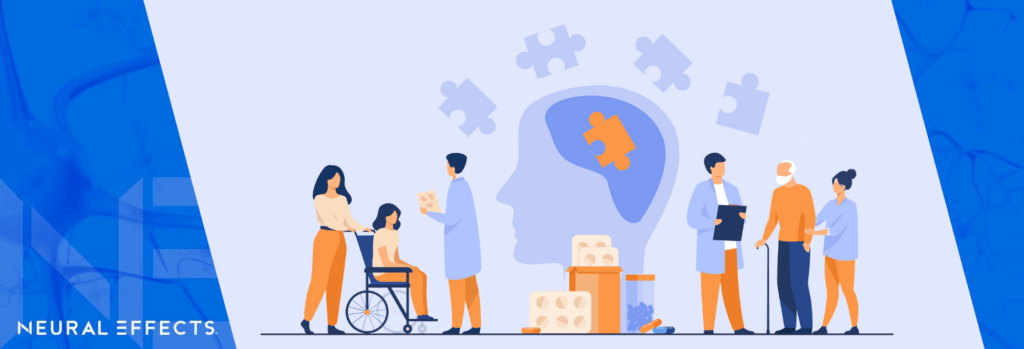The goal of therapy for dementia patients is to maintain the patient’s independence and current cognitive abilities for as long as possible. It may involve physical therapy, cognitive stimulation therapy (CST), occupational therapy, and other exercises depending on the diagnosis of the patient.
Some types of dementia are more responsive to active therapy than others. So in this post, we explain when therapy is the most helpful, along with other key information:
- The most common signs of dementia
- What evaluation for dementia therapy involves (even if you already have a basic diagnosis)
- What therapy for dementia is like at Neural Effects
- Who benefits the most from therapy
- How you can continue working on your health at home
- What outcomes you can expect from therapy
Neural Effects is unlike other treatment centers for dementia. Rather than sending you to different types of therapists across the city, we provide all needed therapy types under one roof. We use the latest evidence-based techniques to stimulate the areas of your brain that need the most help. We are located in Provo, Utah, and serve anyone in Salt Lake City or the Utah valley area. To schedule an evaluation or learn more, please contact us.
Signs and Symptoms of Dementia
A few memory lapses, difficulty finding the right word, or a shortening attention span can just be part of getting older. How do you know if cognition changes are natural aging or a sign of something more? Through testing.
Not everyone with dementia symptoms actually has dementia. If you do have dementia, early detection gives you a better chance of slowing your cognitive decline.
So if you, a family member, or a friend, notice any signs of dementia, it’s worth getting an evaluation.
Here are some of the most common signs of dementia progression:
- Memory lapses.
- Stumbling over words.
- Difficulty finding the right words.
- Feeling agitated or flustered for no reason, or for situations that never bothered you before.
- Getting confused or disoriented when you’re driving.
- Difficulty planning or organizing.
- Motor function changes such as stumbling more often or decreased manual dexterity.
- Changes in behavior noted by family members.
Getting Evaluated for Dementia

The testing we offer at Neural Effects is known as neuropsychological testing or neurocognitive evaluation. Its purpose is to clarify what types of cognitive problems you’re facing (if any) so we can provide tailored, appropriate therapy.
Some patients arrive at our clinic with a diagnosis from their doctor in hand. Others are in need of testing.
If you already have a dementia diagnosis, we will review your existing testing and imaging results, then perform our evaluation to better understand your needs.
If you do not have a dementia diagnosis, we will evaluate you and then recommend follow-up testing if necessary. We work closely with the neurology clinic next-door. Their physicians (or another doctor of your choosing) can collaborate with us on your care, including discussing medication options. If you need any additional brain scans, we can order those.
During our examination, you’ll take a series of tests designed to evaluate your memory, executive function, attention, and language skills.
We also evaluate patients for depression and anxiety because some of their symptoms overlap with dementia. As a result, patients are sometimes misdiagnosed with dementia when they really just need appropriate treatment for depression or anxiety.
Other patients suffer from depression or anxiety and dementia concurrently. Either way, knowing if these conditions are contributing to your symptoms is key to getting the right treatment.
Some people get a clean bill of health after an evaluation. Others are diagnosed with mild cognitive impairment, early stage dementia, vascular dementia, Alzheimer’s disease, dementia with Lewy bodies, frontotemporal dementia, or a handful of other dementia types.
Note: Mild cognitive impairment (MCI) is less severe than early stage dementia, but many people (including doctors) use the terms interchangeably. MCI does not always progress to dementia, especially when caught early. Therapy is especially important for patients diagnosed with MCI because it can help slow the decline.
A complete diagnosis is usually the result of a medical doctor’s evaluation (often a neurologist) in addition to the type of testing we do at Neural Effects. Knowing what you have and how it’s treated will help you and your loved ones make a dementia care plan.
After your evaluation is finished, we’ll schedule a meeting with you and key family members or friends to explain our findings and treatment recommendations. This meeting usually takes 45 minutes to one hour so we can be thorough and address any questions you may have.
What Therapy Is Like for Dementia Patients
Dementia treatment typically consists of medication and therapy.
Therapy for dementia patients is not the same from clinic to clinic. Many patients are only given medication; at best, they receive a list of referrals to a slew of therapists (occupational, physical, cognitive, psychological), which then requires driving to and from multiple locations across the city.
At Neural Effects, we bring more of the therapies that patients need under one roof. We’re located close to our most trusted neurologist’s office to minimize driving time. In addition, we take an approach that no other clinics do: Our patients engage in supervised cardiovascular exercise to prime their brains for cognitive therapies.
Exercise results in something called a post-exercise cognitive boost (PECB). The brain is flooded with oxygen, helpful neurochemicals like brain-derived neurotrophic factor, and other resources. At this time, the brain is best able to engage in neuroplasticity (the brain’s ability to fix itself or build new connections).
While neuroplasticity is not a cure for dementia, it helps most patients stave off decline. Some even make small improvements in cognitive function.
After exercising, patients play cognitive games with the therapist. The games are focused on areas of weakness identified during our evaluation. So, if we identify memory as an area of your brain that needs work, we’ll focus on exercises that stimulate the regions of your brain that govern memory.
For example, you might get a handful of picture cards. We’ll ask you to place them in a certain order and make up a story to describe why they’re in that order. At our next session, we’ll have you recall the correct card order.

Other exercises focus on problem solving skills, attention, vision, or anything else the patient needs.
If possible, we love to have a family member present during therapy. That way, we can teach them how to continue these exercises at home, how to adjust home routines to accommodate for any cognitive deficits the patient has, and answer any care questions that arise.
Therapy continues for as long as you want it to. Some patients have family members who learn what they need over the first few sessions and then continue on at home for a while before resuming treatment. Others love the ability to interact with therapists every week and notice the difference in how they think and feel when they make regular visits.
The right balance depends on the patient.
Who Benefits the Most from Therapy for Dementia?
Physical and cognitive therapies at our clinic have the greatest benefit for patients with mild cognitive impairment or early-stage dementia. These patients have the greatest ability to understand what we want them to do, and their brains have more resources to engage in the exercises.
When dementia is more advanced, therapy focus and treatment options shift. Patients with later stage dementia may do better working exclusively with an occupational therapist who focuses on activities of daily living, for example.
Patients who have good support at home often see the best results. If you are willing to devote your full effort to therapy when we’re in session and implement our recommendations at home, you’ll have a better outcome than patients who don’t want to attend or who don’t continue their exercises at home.
Does this mean that you can’t have a good outcome from therapy without a support network at home? Not at all! But if you can get someone to help you stay on track and make some lifestyle changes, it really can make a difference.
Does Therapy Replace Medication for Dementia?

Some patients want to know if therapy means they won’t need medications.
If you have mild cognitive impairment (MCI), you may not need medication. For moderate dementia or more severe disease progression, medication is a good idea. Our general recommendation is that it’s best to try anything that can help.
For MCI, therapy without medication is often sufficient. For dementia with a known cause (like Alzheimer’s), it’s often beneficial to pursue both medication and therapy.
You can read more about medications for Alzheimer’s disease on Alz.org.
This article explains options to help with memory loss and a few other cognitive symptoms:
- Cholinesterase inhibitors: Donepezil, Galantamine, and Rivastigmine.
- Memantine.
Some patients with severe dementia and resulting behavioral struggles are also given the antipsychotic drug Risperidone. It is only intended to be used short-term if the patient is in danger of hurting themselves or others, and there are non-pharmacological alternatives you can try first. You can read more about antipsychotics, the risks/benefits, and side effects from the Alzheimer’s society here.
Note: We do not prescribe medications for dementia but are happy to refer you to a neurologist if we think they will help.
How You Can Bring Therapy Home

At Neural Effects, we give patients:
- Weekly “homework” to do with caregivers.
- Recommendations for lifestyle adjustments.
The homework is usually one or two fun games that will continue building on whatever we worked on in our sessions. Many of the cognitive exercises recommended for post-concussion patients in this post from our sister clinic are also helpful for dementia patients.
Other changes you can make to help your brain include:
- Dietary changes. Some changes we recommend are reducing sugar and simple carbohydrates, cutting out gluten, and increasing intake of fish, fruit, and vegetables. Some diets to consider are the Mediterranean diet and Keto flex diet.
Diets won’t reverse dementia, but they go a long way in improving your brain’s ability to process information.
You can learn more about eating for brain health here.
- Supplements. A few to consider are 5 mg of melatonin 30 min before bed (to improve sleep), methylcobalamin (vitamin B12), vitamin D3, fish oil, and Coenzyme Q10.
Note: Consult with your doctor before taking any new supplements in case they interact with any medications you’re currently taking (such as blood pressure or cholesterol medication).
- Improved sleep hygiene. A consistent bedtime routine and bedtime is great for the brain (true for both younger and older adults). You may find that dementia symptoms are less severe when you focus on improving sleep.
- Exercise and time outdoors. We can’t overstate how important regular exercise is. Studies and clinical trials show that patients who engage in regular exercise experience significant benefits not only in terms of fitness and strength, but also in areas of cognitive function, including attention, memory, and executive function. We recommend getting 30 minutes of physical activity per day, five to 7 days of the week. Spending 30 minutes outdoors (even if it’s just lounging in the sun) can also work wonders for your mood and wellbeing.
- Mental health care. Aging comes with many changes that can affect mood, happiness, and quality of life. Don’t hesitate to seek help from mental health professionals in psychiatry or psychotherapy. You can also try going on more social outings, or engaging in meditative practices such as deep breathing exercises and yoga.
- Good dental hygiene. Use an electric toothbrush and flosser to ensure your oral hygiene stays up to snuff. Poor dental health is linked with development or progression of Alzheimer’s and other forms of dementia.
We can also provide contact information for local support groups and other information to carers who are adjusting to the changes in their family. Caregiving can be an emotional and exhausting process, so remember to get the support you need, too.
Results: What to Expect from Therapy

How successful therapy is depends on what type of dementia you have and how advanced it is.
If you have mild cognitive impairment or are in the early stages of dementia, we can often prevent further cognitive decline. Some patients even show improvement!
We want to do everything we can to prevent decline. Without intervention, the disease progresses, which is why active therapy makes sense.
Ultimately, the goal is to maintain your current cognitive abilities and independence level for as long as possible.
Neural Effects is unlike other treatment centers for dementia. Rather than sending you to different types of therapists across the city, we provide all needed therapy types under one roof. We use the latest evidence-based techniques to stimulate the areas of your brain that need the most exercise. We are located in Provo, Utah, and serve anyone in Salt Lake City or the Utah valley area. To schedule an evaluation or learn more, please contact us.
